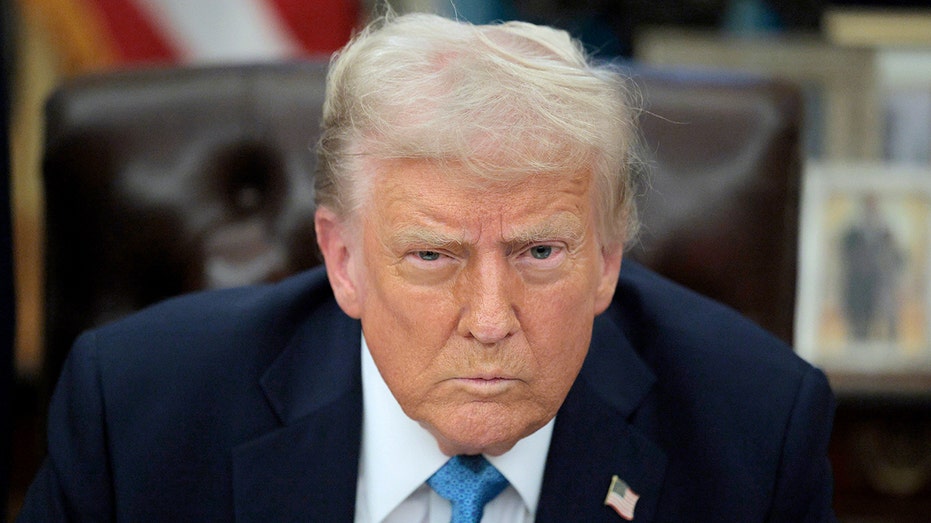- by foxnews
- 04 Feb 2025
Washington insiders simulated a second Trump presidency. Can a role-play save democracy?
Washington insiders simulated a second Trump presidency. Can a role-play save democracy?
- by theguardian
- 31 Jul 2024
- in politics

It is the afternoon of 20 January 2025 and Donald Trump is in his White House dining room, glued to the same TV where he sat transfixed as the January 6 attack on the US Capitol unfolded four years ago. This morning, he completed one of the most spectacular political comebacks in US history, reciting the oath of office at the inauguration ceremony that returned him to the most powerful job on Earth.
The peaceful marches are portrayed on Fox News, the channel he is watching, as anarchic disorder. Trump grows increasingly incensed, and that evening calls his top team into the situation room with one purpose in mind: to end the demonstrations by any means necessary.
The scenario was imaginary, but the discussion around it was very real. Dozens of men and women in a Washington DC-area hotel conference center were seated at tables arranged to resemble the White House situation room, wearing name tags denoting their part in the role-play. Prominent people from both parties were in character as the president of the United States, AKA Trump; the joint chiefs of staff; Republican and Democratic governors; Congress members; federal prosecutors; religious and business leaders; and community organizers.
About 175 people participated in five exercises, bringing to the process an extraordinary wealth of bipartisan institutional knowledge. Among the lineup were senior officials from successive administrations of both parties, including the Trump administration.
They came with a mission: to wargame Trump acting out the most extreme authoritarian elements of his agenda and explore what could be done, should he win in November, to protect democracy in the face of possible abuses of power. What they discovered could be used to inform public debate and sound the alarm about what most participants agreed was a woeful lack of preparation.
This year, the games included that imaginary scenario in which Trump, newly ensconced in the Oval Office, invokes the Insurrection Act to deploy military forces into American cities to fight supposed anarchy and crime.
The Guardian attended two of the five exercises in the role of observers.
Participants attended under the so-called Chatham House rule, meaning that what was said in the simulations could be reported publicly but not who said it. Some individuals agreed to be named, including Michael Steele, former chair of the Republican National Committee; Elizabeth Neumann, deputy chief of staff of the Department of Homeland Security under Trump; and Richard Danzig, the navy secretary under Bill Clinton.
The Transition Integrity Project imagined the then far-fetched idea that Trump might refuse to concede defeat, and, by claiming widespread fraud in mail-in ballots, unleash dark forces culminating in violence. Every implausible detail of the simulations came to pass in the lead-up to the US Capitol attack on 6 January 2021.
Take the scenario that Trump might invoke the Insurrection Act to go against street protests. The 1807 law gives presidents the power to deploy the US military to suppress insurrections and quell civil unrest. Trump already considered this in 2020, when White House aides drafted a proclamation order invoking the act in preparation for suppressing Black Lives Matter protests in the wake of the police killing of George Floyd. According to the Washington Post, similar drafts have been drawn up recently by Trump associates. .
In the course of the Insurrection Act tabletop exercise, the person role-playing Trump initially met resistance from senior military figures who tried to cling to the Posse Comitatus Act barring federal troops from engaging in civilian law enforcement. As the scenario unfolded, Trump grew impatient and ended up firing the joint chiefs of staff, replacing them with military officers who would do his bidding and federalise the national guard.
Eaton pointed to a letter from May 2021 signed by 124 retired generals and admirals that propagated the lie that Biden stole the 2020 election from Trump. He added that studies had shown that almost one in seven of those prosecuted for storming the Capitol on January 6 had a military background.
Over the next few hours, the president sat on his phone firing off social media posts, while his cabinet executed his agenda. The justice department announced the investigation of Biden and others in his circle, and instructed the FBI to be very aggressive, to the extent of looking for even minor crimes.
As the Brennan Center has highlighted in its initial findings from the war games, participants came away from the simulations sobered by the experience. Above all, they discovered that there were far fewer effective restraints at their disposal than they had expected.
Such apprehensions are disturbing. Yet the intention of the exercises was not to stun pro-democracy activists into depressed paralysis.
The exercises pointed to some positive guardrails that might still hold. State governors have their own reserves of independent authority, which, if combined with the capabilities of state attorneys general, could block, or at least slow down, federal abuses.
- by foxnews
- descember 09, 2016
Travelers flock to top religious landmarks deemed 'most Instagrammable'
Travelers visiting religious landmarks across the world may see a photo opportunity that's worthy to share on social media. Here are 10 popular spots, plus some attractions in the U.S.
read more





